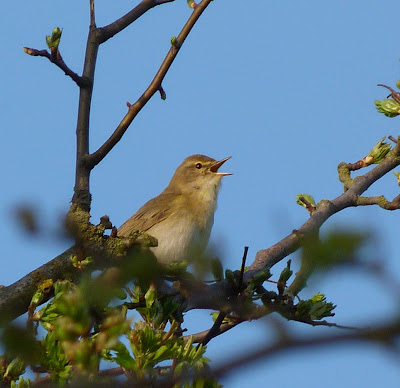A pair of Blackbird set up with a nest only a foot above our bins, so to avoid disturbance we have moved the bins to another location. There appears to be three pair visit the feeding station in the back garden.
One of which appears below.
Thursday, 14 April 2011
Tuesday, 12 April 2011
Persistence Pays
Another visit to Prestwick Carr has at long last produced for me a sighting of a Tawny Owl. It sounds like I am about the last one to connect with this one, but its now done. At least I now know that I had been looking in the correct spot on my many previous attempts.
Further up the bridle way there were about twenty Fieldfare in the field and a cracking Yellowhammer lit up by the sunset. Three or four Willow Warbler occasionally called from the hedgerow but the cold breeze seemed to take the edge off their enthusiasm.
On the walk back down the bridle way, the large flock of Golden Plover were moving across the horsey fields.
In all I saw three Wheatear in the field North of the second gate and a further two in the horsey field
Further up the bridle way there were about twenty Fieldfare in the field and a cracking Yellowhammer lit up by the sunset. Three or four Willow Warbler occasionally called from the hedgerow but the cold breeze seemed to take the edge off their enthusiasm.
On the walk back down the bridle way, the large flock of Golden Plover were moving across the horsey fields.
They are all dressed up in their summer outfits
In all I saw three Wheatear in the field North of the second gate and a further two in the horsey field
Then just as I was getting into the car these Curlew came over and settled in the adjacent field
Sunday, 10 April 2011
Prestwick Carr
Following Peter's posting regarding the Tawny Owl at Prestwick Carr I set off determined to get a sighting and hopefully a pic. So armed with scope, tripod, camera, bins, and a copy of Peter's photo I headed for the bridle path. I quickly identified the roost branches in the photo and could even see the droppings on the branch below but result as normal - zero.
Last year it totally evaded me and I'm still not convinced that Peter and Bill don't have one of the plastic owl thingies.
Visited the spot three times over the next couple of hours with the same result.
However I was pleased to watch Buzzard, Roe Deer, Golden Plover, Mistle Thrush, Curlew, Long-tailed Tit and the return of Willow Warblers and Wheatear
Last year it totally evaded me and I'm still not convinced that Peter and Bill don't have one of the plastic owl thingies.
Visited the spot three times over the next couple of hours with the same result.
However I was pleased to watch Buzzard, Roe Deer, Golden Plover, Mistle Thrush, Curlew, Long-tailed Tit and the return of Willow Warblers and Wheatear
Saturday, 9 April 2011
Druridge Pools
Little Grebe was very successful at finding fish just in front of the hide with little else of note in view
Peacock and Small Tortoiseshell butterfly were numerous along the walk to the hide. If this weather keeps going ther could be dragonfly in four weeks time, but no doubt there will be a sting before that.
Shovelers were still present in the flooded fields along with Teal and Wigeon
Friday, 8 April 2011
Cresswell Avocet
With this sort of weather the coast had to be worth a visit, so we headed up to Creswell. On the way north we could see eight Avocet on the west bank of Cresswell pond.
A little later two had made their way to the North end of the pond.
A little later two had made their way to the North end of the pond.
Cracking birds on a cracking day.
Tuesday, 5 April 2011
Tawny Mining Bee
It was on the 16 April in 2009 and 17 April in 2010 that the Tawny Mining bees appeared in a specific two metre square in the front garden. This year they have appeared early -5 April2011.
Tawny Mining Bee, Adrena Fulva
This is typical of their nests which they mine
and even more strange these hang around the perimeter of the activity as they have done on previous years
Its all very puzzling.
Tawny Mining Bee, Adrena Fulva
and as on previous visits these creatures, pictured below, which I believe to be Andrena Bimaculata outnumber the Mining bee by ten to one and are particularly aggresive towards them
Its all very puzzling.
Friday, 1 April 2011
St Mary's North Bay
A brief visit to St Mary's Island this morning. On the North Bay beach, only a Bar-tailed Godwit and a single Sanderling. There had been three but two departed.
Turnstone, Oystercatcher and Curlew were taking shelter, from the ever increasing wind, in the rock gulleys with a few Eider offshore, in the bay.
Turnstone, Oystercatcher and Curlew were taking shelter, from the ever increasing wind, in the rock gulleys with a few Eider offshore, in the bay.
Subscribe to:
Posts (Atom)





















